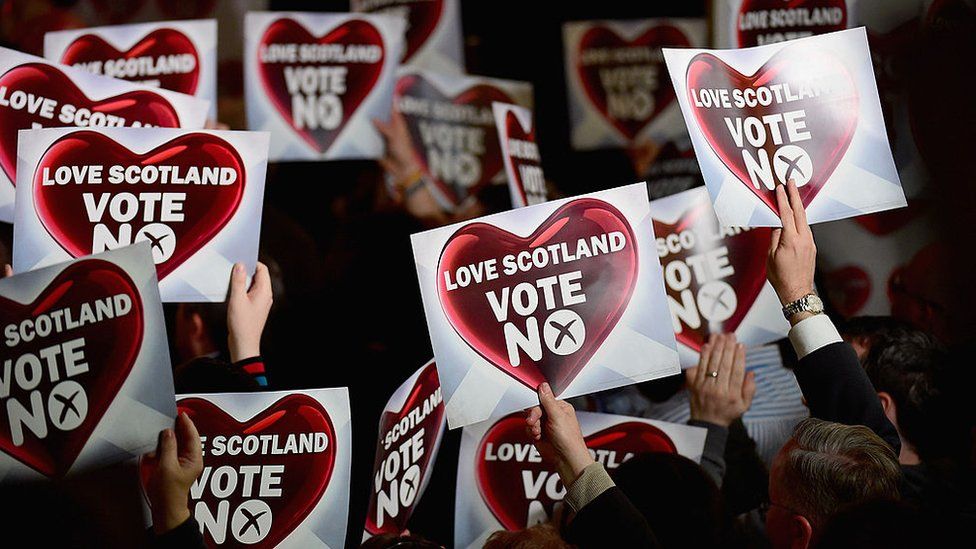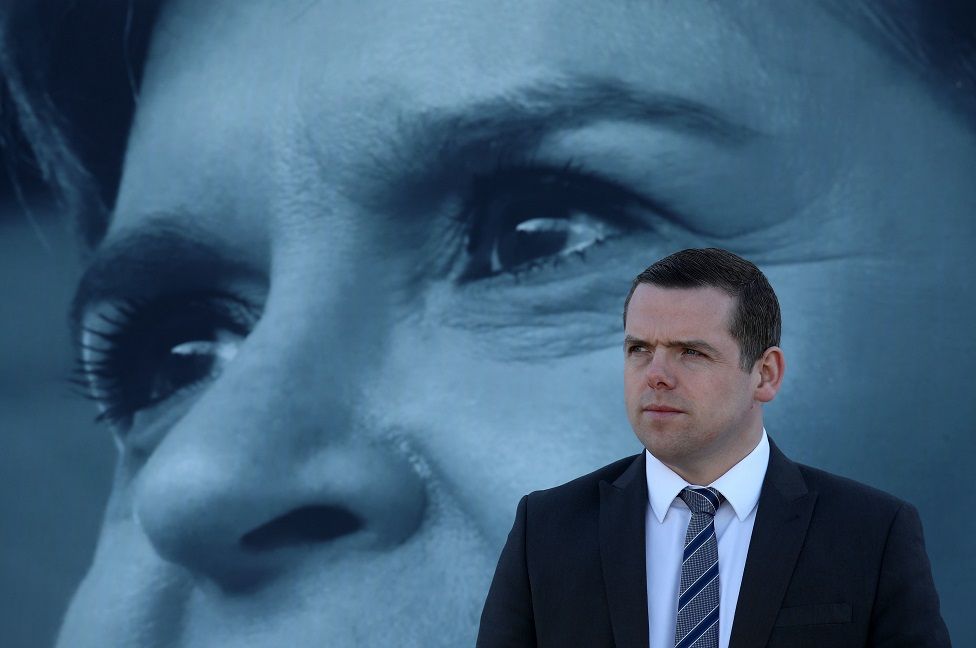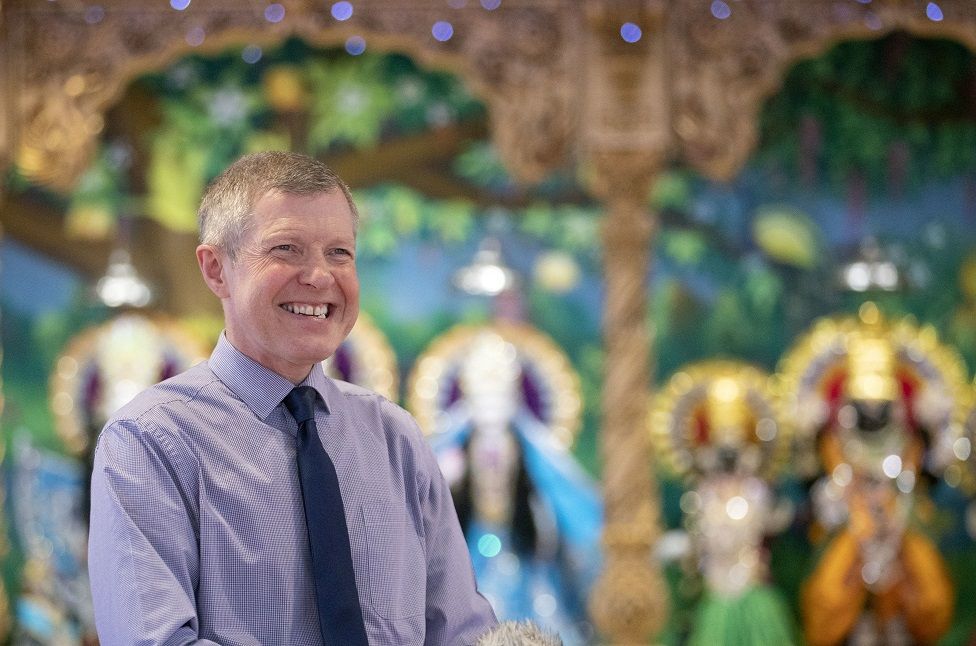In the second of two Scottish election pieces, we look at the parties opposing another vote on independence.

image copyrightGetty Images
In the second of a two-part series looking at the Scottish election, we explore the strategies of the parties who want to stop another independence referendum.

Scotland goes to the polls in a couple of weeks’ time – and the result could have a significant impact on the future of the union.
The SNP and Scottish Greens back another referendum in the next five years. Alex Salmond – who is leading the new Alba Party – wants even more urgency. I wrote about it earlier this week.
But unionist parties – those who favour Scotland staying part of the UK – are going into this election trying to stop them holding the balance of power, and arguing a debate on Scotland’s constitutional future would be a distraction when the country is trying to recover from coronavirus.
So what’s their plan to convince voters?

SCOTLAND ALERTS: Get extra updates on BBC election coverage

If you look at most election campaigns, the main question is normally a simple one. Who do you want to run the country?
Things are slightly different in Scotland just now. The main opposition parties don’t really argue that they are going to form the next Scottish government. Instead, they are asking voters to back them to stop the SNP winning a majority – and to stop another independence referendum.

image copyrightPA Media
The Scottish Conservative pitch at this election relies heavily on their unionist credentials. In the last few years, opposition to independence has given the party a new lease of life in Scotland, leading them to leapfrog Scottish Labour into second place last time around.
Douglas Ross, the party’s new leader, told me for Radio 4’s PM programme: “If we can stop that SNP majority again we can stop another referendum and really get our parliament and Scottish politics focussed on recovery – and I think that’s where the public want to see their politicians really focussing all their efforts.”
There’s a bit of an irony in that answer. While the Conservatives are opposed to a referendum – they are happy to talk about independence because it is one of their main selling points to the electorate.
There’s also the fact that Boris Johnson has made clear that he will refuse to grant the Scottish Parliament the power to hold another referendum – even if there’s a pro-independence majority.
I asked Douglas Ross: doesn’t the prime minister saying he’ll block a referendum undermine the argument that you need to vote Conservative at Holyrood to stop one?
“The SNP have said they don’t care what a Tory PM or a UK government says – they will go ahead regardless with a wildcat, illegal referendum,” he said, referring to the SNP’s suggestion it would pass a referendum bill and dare Westminster to challenge it in the courts.
He added: “Nicola Sturgeon has confirmed she wants a referendum in the next couple of years. She has accepted that means campaigning to separate Scotland from the rest of the UK during our recovery phase from this pandemic – and I don’t want to see that division and arguments breaking up families and workplaces and communities again”.

image copyrightPA Media
Opposition to independence has reinvigorated the Tories in Scotland – they have in the past urged people to lend them their votes to stop another referendum and in the past it seems to have worked.
The opposite is true for Labour, the party who once dominated Scotland.
Their apparent lack of clarity on the constitution is seen as one of the main reasons their support has fallen. I’ve written before about the party’s Scotland problem.
But there is some optimism under new leader Anas Sarwar. There are even some whispers about the party maybe retaking second place as an alternative to both the SNP and Conservatives (those whispers are played down by Labour strategists – and dismissed as fanciful by many Tories too).
Mr Sarwar told me: “The mistake that both Douglas Ross and Nicola Sturgeon make is they think they can only talk to the half of the country that agrees with them and not the other half. I’m not willing to do that.”
The problem is – Labour has tried to move beyond the constitution before. It’s position has, the argument goes, left it in a bit of a constitutional no man’s land; nationalists disliked that it didn’t support independence, unionists thought it was too soft.
Mr Sarwar added: “People know my view. I don’t support independence – I don’t support a referendum. I think it would be wrong for us to come through this collective trauma of Covid and go back to those old arguments where we seek to divide people across the country. Instead I want to focus on rebuilding our NHS, restoring our economy, renewing our education system so that it works for everyone across the country.”

SCOTLAND’S ELECTION: THE BASICS
What’s happening? On 6 May, people across Scotland will vote to elect 129 Members of the Scottish Parliament (MSPs). The party that wins the most seats will form the government. Find out more here.
What powers do they have? MSPs pass laws on aspects of life in Scotland such as health, education and transport – and have some powers over tax and welfare benefits.
Who can vote? Anyone who lives in Scotland, is registered to vote and aged 16 or over on 6 May is eligible. You can register to vote online.

I’ve been speaking to quite a few candidates in the last couple of weeks. On the unionist side – many would admit tactical voting is a big part of this election.
If the Conservatives are the biggest pro-union party in an area, some Labour voters are considering lending them their vote or vice versa. Many candidates would argue it has worked in the past.
But there are some unionist strategists who are nervous. They believe the SNP have a decent chance of forming a majority on their own. Even if they don’t there is likely to be a pro-referendum majority when you factor in the Scottish Greens (and maybe Alex Salmond’s Alba).
So being the biggest unionist party in the next parliament really matters. The leader of that party will play a big part in framing the debate over another referendum. If one does happen they’ll be a key voice in framing the arguments which could decide the future of the union

image copyrightPA Media
There is another unionist voice in this debate too. The Scottish Liberal Democrats. In the early years of devolution, they were in power with Labour as a coalition. In the last Holyrood parliament, they were the fifth party.
Their leader, Willie Rennie, told me: “What we want to do is put the recovery first. We want to tackle the issues that we’re really strong on in terms of investing in mental health services, education, climate, jobs. Those are the top priorities for the Liberal Democrats. You won’t get that with the Conservatives – because they want to spend the next five years arguing with the SNP about independence.”
He added: “We need partnership and we need to make sure we put that dark division of the last five years certainly – the poisonous atmosphere that’s developed – behind us and work together in partnership.”
You’ll notice the pitch is quite similar among the three major unionist parties: vote for us so we can focus on recovery from the pandemic instead of independence.
The SNP say the opposite – independence is crucial to controlling that recovery
In two weeks’ time we’ll find out which of those visions Scottish voters prefer.



